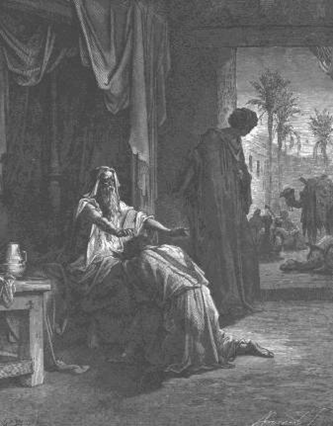Rightly Understanding God’s Word: Whole-Book Context, Part 2, by Craig S. Keener

Isaac blesses Jacob. By Gustave Doré.
Genesis is full of accounts that underline for Israel the miracle of their blessing and existence—three barren matriarchs (18:11; 25:21; 30:22), royal abduction or threatening of matriarchs (12:13; 20:2; Isaac repeated his father’s example—26:7), and so on. Elsewhere in Genesis someone other than the patriarch makes a choice, nevertheless leaving the right land to the patriarch (13:9-13; 36:6-8). In the context of the themes the entire book emphasizes, it is consistent to believe that God worked through Rebekah’s deception, as he worked through a variety of other means, to protect his chosen line.
This is not to say that the deception was God’s preferred means to accomplish this, though he sometimes blessed deception when it would save human life from unjust oppressors (Ex 1:18-21; Josh 2:5-6; 1 Sam 16:1-3; 2 Sam 17:19-20; 2 Kings 8:10; Jer 38:24-27). When Isaac asked Jacob his name, he lied to get the blessing (Gen 27:18-19), hence incurring his brother’s murderous anger (27:41). His mother promised to send for him when it proved safe to return (27:45), but apparently she died in the meantime hence could not send for him, so when he is returning he expects that Esau still desires to kill him (32:11). Thus he struggles all night with the Lord or his agent, and he is confronted with his past. This time, before he can receive the blessing from God, he is asked his name and must tell the truth (32:26-27; and then gets a new name—32:28), in contrast to the time he sought his father’s blessing (27:18-19). But God was with Jacob even in spite of himself; he met angels both going from (28:12) and returning to (32:2) the land. In this story, though Isaac outlives Rebekah, she was the one with the greater perception of God’s purposes for their descendants.
15. Casting Lots in Acts 1:26
Some interpreters today suggest that the apostles made a mistake in casting lots for a twelfth apostle, even though it was before the day of Pentecost. The immediate context, however, suggests something positive; the believers were in prayerful unity (1:12-14; 2:1), and now Peter has exhorted them to replace the lost apostle (1:15-26). Would Luke spend so much space to describe a practice he disagreed with, and then fail to offer any word of correction?
Some interpreters today suggest that the apostles made a mistake in casting lots for a twelfth apostle, even though it was before the day of Pentecost. The immediate context, however, suggests something positive; the believers were in prayerful unity.
Category: Biblical Studies, Spring 2004


